
![]() Bandleader Radames Gnattali (1906-1988) was a major innovator and a bridge between the worlds of Brazilian classical and popular music. He worked in popular bands of the samba-cancao era in the 1930s, and triumphantly straddled the bossa nova era as a respected artist, particularly in his European tours. Gnattali also pioneered the big-bandy jazz-samba style known as gafieira and was a mentor to several artists involved in the choro revival of the 1960s and '70s. Here's a quick look at his work...
Bandleader Radames Gnattali (1906-1988) was a major innovator and a bridge between the worlds of Brazilian classical and popular music. He worked in popular bands of the samba-cancao era in the 1930s, and triumphantly straddled the bossa nova era as a respected artist, particularly in his European tours. Gnattali also pioneered the big-bandy jazz-samba style known as gafieira and was a mentor to several artists involved in the choro revival of the 1960s and '70s. Here's a quick look at his work...
 Radames Gnattali "Sucessos De Carnaval" (Continental Records, 1955) (LP)
Radames Gnattali "Sucessos De Carnaval" (Continental Records, 1955) (LP)
Bandleader Radames Gnattali cuts loose on this cheerful, robust set of carnaval classics, including oldies from composers such as Herivelto Martins, Mario Lago and Noel Rosa, as well as several Lamartine Babo and Joao de Barro. The disc is divided between sambas (on Side One) and marchas (Side Two), with a perky vocal chorus led by soloists Emilinha Borba and Jorge Goulart. Fun stuff: exotic and antique to our modern ears, perhaps a little square-sounding at the time. But fun, nonetheless!
Radames Gnattali "The Piano Of Radames Gnattali -- Recordings: 1954-1956" (Black Round Records, 2009)
Radames Gnattali "Radames Gnattali & The Quarteto Continental Interpet Radames Gnattali: 1957" (Black Round Records, 2009)
Radames Gnattali & Laurindo Almeida "Suite Popular Brasileira Para Violao E Piano" (Continental Records, 1956) (LP)
Radames Gnattali "Dois Concertos De Radames Gnattali" (Festa Records, 1959) (LP)
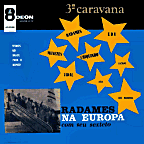 Radames Gnattali "3rd Caravana: Radames Na Europa" (EMI-Odeon, 1960) (LP)
Radames Gnattali "3rd Caravana: Radames Na Europa" (EMI-Odeon, 1960) (LP)
An improvisational romp that is both lighthearted and musically potent, with Gnattali and his crew tackling numerous Brazilian standards (starting with Ary Barroso's "Aquarela do Brasil," adding some bossa nova, and moving on from there...) This band, which toured Europe under the patronage of the Brazilian government, featured several top players -- accordionist Chiquinho do Acordeon, Ze Menezes on guitar, Edu da Gaita blowing harmonica, some killer percussion and Gnattali on piano, of course -- and these seasoned players really get into vamping on these tunes, particularly on the last few tracks. Gnattali's piano tends to frame the sessions with sugary tones, but the soloists go pretty wild. Edu da Gaita shines on a medley of northeastern baiao and forro while the accordion numbers will really wow you. This disc is best heard as a showcase for virtuosi, rather than for the songs themselves: although there are some delightful tracks (the choro tune, "Primeiro Amor," for example) the improvising and in-jokes take over on most songs. Mostly this is fine -- they certainly sound like they were having fun with it!
Radames Gnattali "Segredo Para Dois" (Continental Records, 1963) (LP)
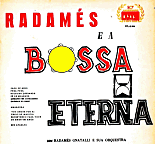 Radames Gnattali "...E A Bossa Eterna" (Continental Records, 1964) (LP)
Radames Gnattali "...E A Bossa Eterna" (Continental Records, 1964) (LP)
Although the album credits this as Gnattali and his orchestra, the accompaniment is minimal -- some tasteful percussion, a tambourine, some light, delicate cavaquinho work. Essentially this is a solo piano album, Radames Gnattali playing twelve of his own compositions in a rolling style that ranges from lushly romantic to lightly emphatic and only slightly showboat-y. It may take a little while to shake off the dinner lounge vibe, but once you get on his wavelength, it's a rewarding journey. Recommended tracks include "Escrevendo Para Voce," which pairs a lively samba rhythm to a surprisingly relaxed piano, and "Pe De Moleque," which showcases Gnattali in full, breakneck choro mode. On the softer side, there's "De Amor Em Amor," which starts out simple, but gets a lot more lavish by the end; also quite nice.
Radames Gnattali & Jacob Do Bandolim "Retratos" (CBS Records, 1964) (LP)
![]() Radames Gnattali & Orquestra Sinfonica Continental "Concerto Carioca No. 1" (Continental Records, 1965) (LP)
Radames Gnattali & Orquestra Sinfonica Continental "Concerto Carioca No. 1" (Continental Records, 1965) (LP)
This far-flung symphony, composed in honor of the 400th anniversary of the city of Rio De Janeiro, is fiercely dynamic, modern, melodramatic, drenched in romance and a wildly eclectic spirit. The orchestra is conducted by Henrique Morelenbaum (father of the fabled cellist and arranger Jaques Morelenbaum) with the piano of Gnattali in the foreground, along with Ze Menezes on electric guitar. The romantic flourishes meld with rock, jazz and contemporary pop orchestrations... It strikes me as a little overcooked and bombastic, but it is an engaging piece... Brash, kinetic and filled with powerful passages; I'm not enough of a classical music maven to really pick this apart, but I'd say it's definitely worth checking out.
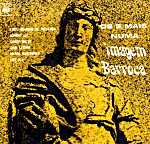 Radames Gnatalli & Luiz Eca "Os 6 Mais Numa Imagem Barroca" (CBS, 1968)
Radames Gnatalli & Luiz Eca "Os 6 Mais Numa Imagem Barroca" (CBS, 1968)
(Produced by Helcio Milito)
An unusual album, with Eca leading sort of a chamber-jazz ensemble, with Radames Gnattali soloing (and often getting quite funky!) on the cravo (or harpsichord)... Not sure who the rest of the band includes, but they play some pretty groovy, modal arrangements, with more than a hint of Miles Davis and Gil Evans in the mix, covering pieces by Johnny Alf, Chico Buarque, Sidney Miller, Milton Nascimento, Dori Caymmi, and a couple by Eca himself. It's not totally my cup of tea, but it's a nice change of pace from Eca's often-rushed trio work of this era. Certainly worth checking out.
Radames Gnattali & Itibere Gomes Grosso "Villa Lobos/Radames Gnattali" (Festa Records, 1968) (LP)
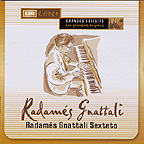 Radames Gnattali "Radames Gnattali Sexteto" (EMI-Brasil, 1975) (LP)
Radames Gnattali "Radames Gnattali Sexteto" (EMI-Brasil, 1975) (LP)
Esteemed pianist and composer Radames Gnattali toured Continental Europe in the 1950s and '60s, bringing Brazilian music to the Old World just as the bossa nova craze kicked into full swing, and was recognized by his countrymen as one of the big figures of the pre-bossa era... This is an album he made in the mid-1970s, when the influence of the North American jazz-fusion scene was washing through Brazil... It's a series of radical reinterpretations of old choro and samba cancao classics, along with a couple of Gnattali's more "serious" pieces. The arrangements are alternately stately and absurd; sometimes it all seems a bit busy and overly baroque, but attentive listening will also prize out the rich harmonic and compositional depths. Not something I'd put on for recreational listening, but it is a fine example of Brazilian musicmaking at a very high level... worth checking out, though a bit on the difficult side.
Radames Gnattali "Serie Depoimento v.2" (Odeon, 1975) (LP)
Radames Gnattali "Radames Interpreta Gnattali" (Continental Records, 1976) (LP)
Radames Gnattali "Radames Gnattali" (Som Livre, 1976) (LP)
Radames Gnattali "A Grande Musica De Noel Rosa" (Copacabana Records, 1979) (LP)
Radames Gnattali "Tributo A Jacob Do Bandolim" (Atlantic Records, 1979) (LP)
With the group Camerata Carioca.
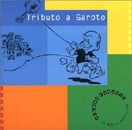 Radames Gnattali & Rafael Rabello "Tributo A Garoto" (Funarte, 1982) (LP)
Radames Gnattali & Rafael Rabello "Tributo A Garoto" (Funarte, 1982) (LP)
Guitarist Rafael Rabello (yeah, they do seem to spell it both ways, 'ph' and with an 'f'...) pairs up with legendary pianist/bandleader Radames Gnattali for a sprightly tribute to choro/samba cancao songwriter Anibal Augusto Sardinha, better known as "Garoto." Garoto's heyday was in the 1930, and his association with Gnattali spans back over the decades. (Garoto died of a heart attack in 1955, while on tour in Europe.) As with many of these instrumental outings, the musicianship is dazzling, but the pace and style quickly get a bit static. Rabello, whizzing between Gnattali's brisk piano riffs, loses some of his trademark subtlety and soulfulness, although you would be hard pressed to find a choro devotee who wouldn't go gaga over this album. Definitely worth checking out.
Radames Gnattali "Vivaldi & Pixinguinha" (Funarte, 1982) (LP)
With the group Camerata Carioca & Joel Nascimento.
Radames Gnattali & Elizete Cardoso "Uma Rosa Para Pixinguinha" (Funarte, 1983) (LP)
With the group Camerata Carioca.
Radames Gnattali "Radames Gnattali" (Libertas, 1984)
Flashy solo piano renditions of a number of Brazilian standards, reaching back to the classic choros of Pixinguinha and the bossa novae of Bonfa and Jobim, with about half the album given up to the immediate post-bossa second wave of composers such as Edu Lobo, Sergio Ricardo and Marcos Valle. It's a bit too grand and declarative for me: a lot of it sounds like the a silent film score recorded for a DVD release. Still, if you're into Gnattali and want to hear him really banging away at some great tunes, you might want to check this out... I found it a teensy bit too robust.
Radames Gnattali "Radames Gnattali" (Funarte, 1985)
In a sparsely arranged album, pianist Gnattali zips through a lively, but brief, selection of favorite choro, bossa, and classical compositions. Accompanying him are Paulinho DaViola and Tom Jobim, with Gnattali and Jobim swapping tributes at the start of the disc; other great tunes follow, including Da Viola's catchy "Sarau Para Radames," and concluding with "Quarteto Popular," a modern classical piece written and conducted by Gnattali. This album only clocks in at about 37 minutes, and while it would have been more considerate of Funarte to have, perhaps, combined it on CD along with some of the other fine albums Gnattali recorded at the same time, it's still a nice look at his fertile musical vision.
Radames Gnattali "...E A Musica Popular" (Kuarup Records, 1990)
Radames Gnattali "80 Anos De Musica Brasileira" (Kuarup Records, 1991)
Radames Gnattali "Retratos" (Kuarup, 1991)
Radames Gnattali "Tres Concertos E Uma Brasiliana" (Soarmec, 1996)
Radames Gnattali "Mestres Da MPB, v.1" (Warner, 1992)
Radames Gnattali "Mestres Da MPB, v.2" (Warner, 1992)
Radames Gnattali "Meu Amigo Tom Jobim" (JVC, 2007)
Olinda Allessandrini "Radames Gnattali Por Olinda Allessandrini" (Tratore, 2005)
Novo Quinteto "Radames Gnattali: 100 Anos" (Rob Digital, 2009)
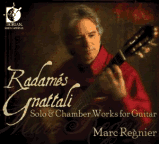 Marc Regnier "Radames Gnattali: Solo And Chamber Works For Guitar" (Dorian Records, 2010)
Marc Regnier "Radames Gnattali: Solo And Chamber Works For Guitar" (Dorian Records, 2010)
(Produced by Marina & Victor Ledin)
A lively, sensitive tribute album, definitely worth checking out. As an "erudite" (classical) musician, Gnattali explored his country's Afro-Brazilian heritage, and incorporated popular contemporary styles such as the samba and choro into his work -- this album includes homages to composers such as Chiquinha Gonzaga, Ernesto Nazareth and Pixinguinha who work also crossed the divide between highbrow music and popular song. As a composer and as a performer, Gnattali's style tended towards note-heavy, forceful arrangements which, on piano, often translated as staccato and frantic; presented here on the acoustic guitar, Gnattali's lush, dense compositions take on a gentler tone, revealing more of his romantic and fluid sides. There are still some flights of pure drive and assertiveness, but they are less jarring and sweeter-sounding than many of Gnattali's original recordings -- it's a rich and compelling introduction to one of Brazil's most revered, but less-well remembered major musicians of yesteryear.


